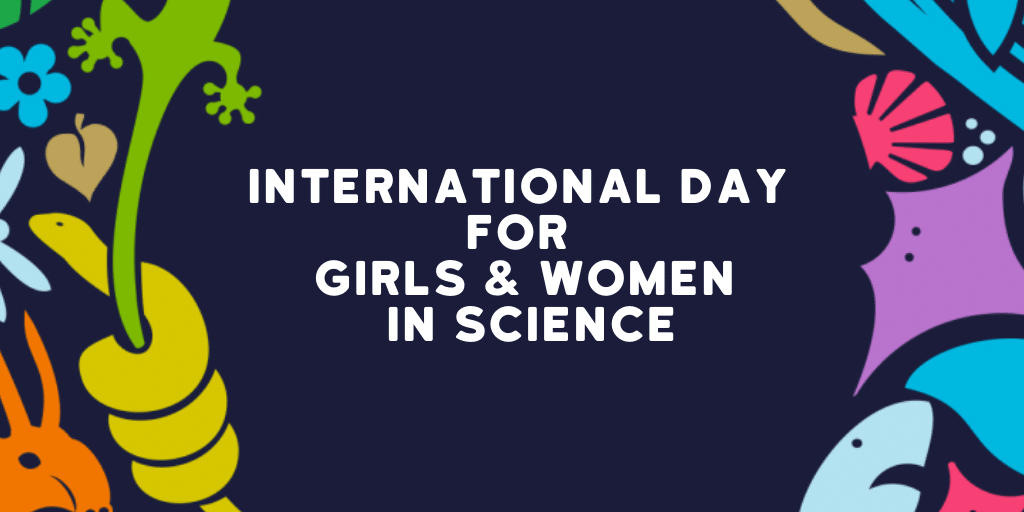
Today, February 11th, marks the International Day of Women and Girls in Science. In the midst of current events, it might be easy to downplay the importance of such an occasion, yet it is more relevant now than perhaps ever before. A few weeks back, as I browsed through my news feed, I strumbled upon an article about a young woman named America’s 2020 Top Young Scientist: Anika Chebrolu. Her research on potential cures for COVID-19 was undoubtedly impressive, but it is something she said that struck me:
“I want to see a world where gender doesn’t define who you are and determine what you can do, what you can accomplish.”
I feel there is no better way to express the essence of today. So, without further ado, join us to celebrate women working tirelessly to make this world a better place and who’s inspiring legacy may one day, make Anika’s world a reality…
Giuliana Furci
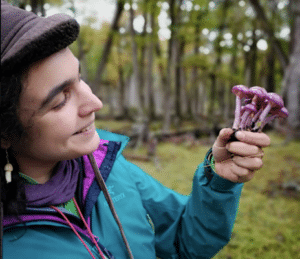
Giuliana gives me optimism about the future of nature because she inspires millions worldwide to care not only about plants and animals but also about fungi. Starting as a complete outsider to the nature conservation movement, she has now built an NGO (Fungi Foundation) that is a world reference and leader in fungi conservation.
I have been lucky enough to be out collecting mushrooms with Giuliana, and her passion and knowledge is a light that touches everything: it’s a love for a neglected kingdom (or queendom) that has no limits. I am sure the work she is doing with the Fungi Foundation will have a massive impact in the world. But moreover, I am sure that as more and more people get to know the importance of fungi, they will also get a touch of the love that Giuliana feels for nature through the mycelial networks that connect everything and that makes me feel enthusiastic about the future of this planet.
Nominated by Rodrigo Oyanedel
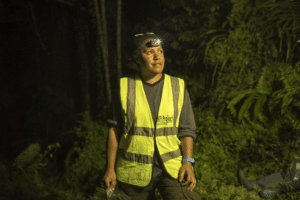
Photo Credit: NFI project (sponsored by UN REDD)
Grace Luke
Papua New Guinea is home to the world’s third-largest rainforest. Grace Luke, a Papua New Guinean biologist, can tell you all about the many different moths, butterflies and other insects that live in these forests. She has worked as a researcher at the New Guinea Binatang Research Centre, a local NGO specialised in biodiversity research and nature conservation. Working at Binatang allowed her to learn her insect species, but also to gain experience in setting up field experiments and best practices in data management. She has also ventured into the social sciences, conducting key informant interviews and focus groups with local community members. Inspired by her research, Grace started to make key tags and jewellery featuring the species she is working with, which helps raise awareness about PNG’s unique biodiversity. Grace just finished her Master’s degree and is currently exploring the option of starting a PhD.
“As a woman I am proud to be a biologist because I get to know the ecology of the rainforest. And at the same time it is nice to show other females that it is a good job to take”
She is a real inspiration to biologists in and outside of Papua New Guinea!
Nominated by Mirjam Hazenbosch
E.J. Milner-Gulland
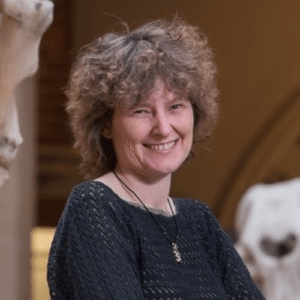
There are so many women in my life that give me optimism about the future of nature; it’s hard to choose! There is no doubt that my PhD supervisor, Prof. EJ Milner-Gulland, is a huge source of inspiration. She managed to excel in conservation science at a time when academia was rife with gender discrimination; and she’s now not only a polymath of social and ecological research, but strives to create a diverse and inclusive research environment, where people from all over the world can come together to combine passion and science, and really make a difference for species and ecosystems. She’s helped to train, mentor and inspire so many people across the world; and I’m super grateful for her leadership and kindness, and the culture and legacy she’s established via a global network of interdisciplinary conservation scientists.
With inspiration and guidance from EJ, one of my own passions is to promote equity and diversity in conservation science, and mentor others. Recently, I’ve been lucky enough to work with some incredible early-career female shark researchers, and I’m especially inspired by women from lower-income countries who are becoming global leaders in the field, despite any hurdles, inequalities and discrimination they may face. In this regard, I want to give a special shout out to my two friends and colleagues, Trisha Gupta and Benaya Simeon: you inspire me with your knowledge, commitment, passion for sharks and empathy for people. Having the pleasure to work with these interdisciplinary women every day gives me optimism for the future of nature, and I hope we can all continue to pay forward the opportunities and support we’ve been given to other female conservation scientists.
Nominated by Hollie Booth
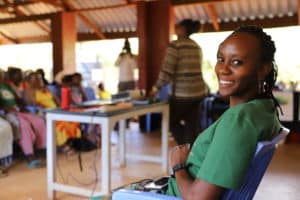
Maureen Kinyanjui
Maureen’s research explores ways to reduce human-elephant conflict in Kenya. Before undertaking a PhD, Maureen worked to resolve challenges faced by local residents living in and around Tsavo National Park in southern Kenya. This involved developing initiatives that sought to improve food security and promote women eco-enterprises. Listening to Maureen explain why she is now doing a PhD is inspiring. I’ve learnt so much from her! I’m lucky to be working towards a PhD alongside a future leader in conservation science.
Nominated by Will Sharkey
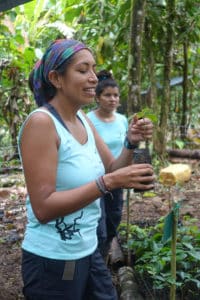
Citlalli Morelos-Juarez
Dr Citlalli (Tali) Morelos-Juarez is a Mexican primatologist and conservationist who began working in Tesoro Escondido (Ecuador) in 2011 after applying to do a PhD at the University of Sussex. Initially coming for one year to study the Brown-headed spider monkey, she immersed herself in the community. Living with a local family, building close friendships and dependencies with many local people in the area, her enthusiasm and love of the forest began to rub off. She never left and is now Field Manager of Jocotoco’s Tesoro Escondido Reserve, which has become a shining example of what community-led conservation can become.
Nominated by Judith Twentyman
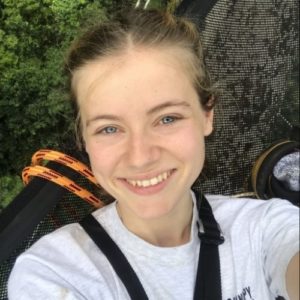
Nina Seale
I’ve been lucky enough to work with Nina Seale throughout the past few years and she is a constant source of inspiration when it comes to using storytelling to get people interested in conservation topics! She is a brilliant science communicator and knows exactly how to tap into the power of social media (go have a look at #AmphibianEyes and see how she brought some much-needed amphibian-love into Twitter recently).
Nominated by Julia Migné
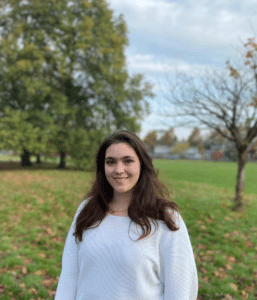
Pria Ghosh
Pria Ghosh is a herpetologist who has studied one of the most pressing challenges facing conservation today: the amphibian pandemic chytridiomycosis. She developed cost-effective molecular diagnostics for Bd, the fungal pathogen which causes chytridiomycosis. These diagnostics are now used to identify local disease dynamics and carry out ongoing monitoring of areas deemed to be high risk for pathogen emergence, primarily in Southern Africa. Now she is working as part of Synchronicity Earth’s Research Team, particularly focussed on using her expertise to develop the Amphibian Programme.
Nominated by Nina Seale
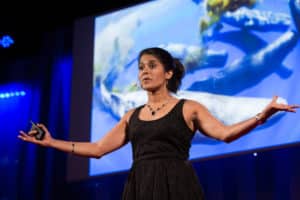
Asha de Vos
Asha de Vos is the first Sri Lankan with a PhD in marine mammal research. She launched the country’s first marine conservation research and education nonprofit, Oceanswell. She believes that the health and future of coastlines depend on local people. Her ground-breaking research is used to inform policy at the local and global level and paves the way for more Sri Lankan and female marine biologists.
Nominated by Félix Feider
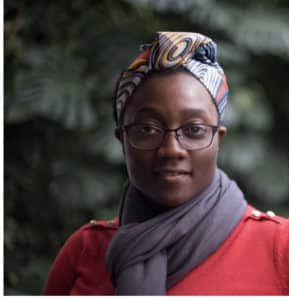
Nobesuthu Adelaide Ngwenya
When everything seemed just but gloomy for my career as an ecologist in a men-dominated field and patriarchal society- where my contributions and ideas wouldn’t be easily accepted, I was very fortunate to be surrounded, mentored and inspired by very powerful women at the early stages of my career. One once told me, “let your work speak for itself” – and that has remained one of my principles till date. Yes, working hard is important, but one other powerful lady-scientist also made me realise that one needs to be bold and go for what they want in order to achieve impact. Indeed , very important principles.
It has not been an easy journey being a woman in science. I draw my inspiration from women making great strides in conservation and live to see other women and girls rise, take up roles in science. Gender in conservation especially in Africa remains a critical issue which requires transformative change and calls for everyone to unite and speak in one voice. What makes me optimistic about the future for nature, is that exceptional female leaders exist (though still very few), and the fact that we are celebrating this day of women in science.

